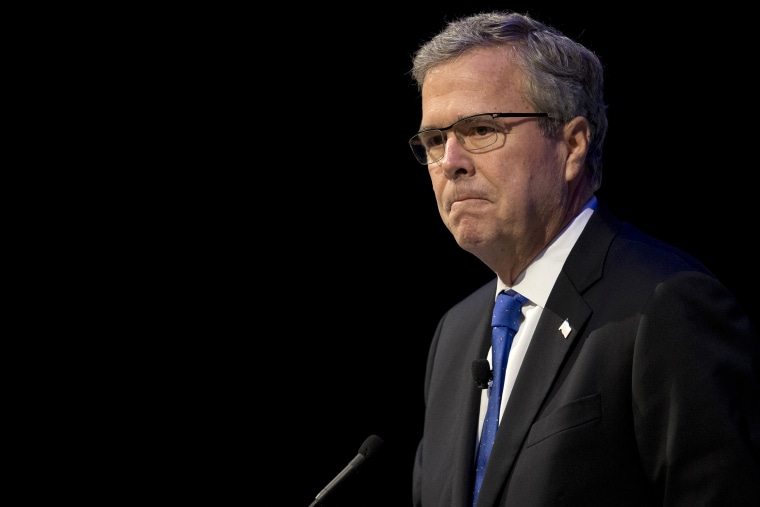Two months ago, Jeb Bush was asked about some of his brother's foreign policy decisions. "I won't talk about the past," the Republican said, adding his unannounced presidential campaign is "not about re-litigating anything in the past."
The Washington Post reported over the weekend that the former governor's position hasn't improved much since.
...Bush dodged reporter's questions about how he might govern differently than his father or brother or whether his views on foreign policy differ from them.... Bush has previously said that the intelligence used to justify the start of the Iraq war was flawed, but he pushed back against a question Friday about whether his brother had made any other mistakes with his foreign policy. "I'm not going to get into that," he said. "That's not particularly relevant in a world of deep insecurity, focusing on the past is not really relevant. What's relevant is what's the role of America going forward?"
The comments were, of course, caught on tape.
The obvious problem with Bush's position is that it's factually wrong. If there's "deep insecurity" in the world, much of it is the direct result of some of his brother's decisions -- most notably a disastrous and unnecessary war in the Middle East that destabilized the region.
If the Florida Republican genuinely believes his brother's wars aren't "relevant" to today's national security challenges, Bush is badly confused about the basics of current events. Indeed, Americans deserve to know whether the former governor has learned any lessons from his brother's devastating failure; "I'm not going to get into that" isn't a satisfactory reply.
The less obvious problem is that Bush has already surrounded himself with the Bush family's team of foreign-policy advisers. In the context of his 2016 candidacy, few things are as relevant as this basic truth.
Jeb Bush believes his foreign policy beliefs should be guided by his brother's staff, but at the same time, Jeb Bush believes his brother's foreign policy decisions aren't relevant to his presidential ambitions. If he sees this as a coherent argument, he's mistaken.
Finally, let's not brush past the contradiction at the heart of Bush's talking points: he insists that "focusing on the past is not really relevant," while at the same time, he's eager to condemn President Obama's handling of international affairs. Last week, the GOP candidate told an audience that Obama "believes that America's power is not appropriate and America's presence is not a force for good," which is both demonstrably ridiculous and an obvious attempt to focus on the past.
There's still plenty of time for Bush to come up with a more lucid response to these questions, though I'll confess to being hard pressed to imagine what those answers might look like. The results of his brother's foreign policies -- and to a very real degree, Jeb Bush's advisers' foreign policies -- were catastrophic. He doesn't want to endorse failure; he doesn't want to condemn his brother; and he can't simply take a pass on the legitimate questions. It's not a recipe for long-term success.
